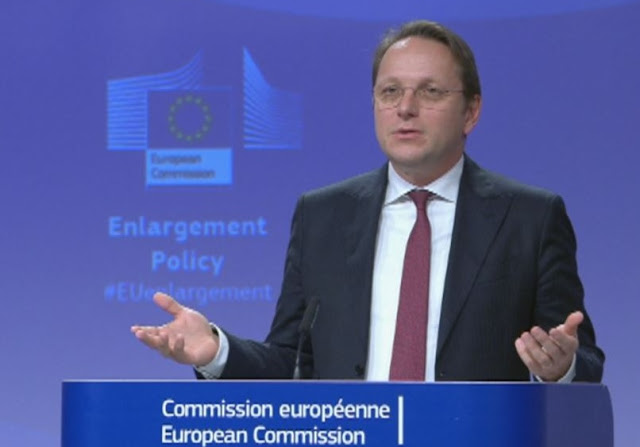 |
| Olivér Várhelyi |
Commissioner Várhelyi made these comments as he presented today the 2020 Enlargement Package and the Economic and Investment Plan for the Western Balkans.
The European Commission is expected to pave the way for Albania for the first membership conference, as, according to its periodic report, it has met the conditions for this.
Albania is assessed in the European Commission Report as having made good progress in key reforms.
The report says that Albania is moderately prepared with public administration reform, where tangible achievements need to be further strengthened.
Albania's judicial system is also estimated to be moderately prepared, where a comprehensive and complete reform has continued.
The new institutions for the self-government of the judiciary have gone through the process of filling vacancies in the Supreme Court and the Constitutional Court.
According to the report, the temporary reassessment of judges and prosecutors, known as vetting, has progressed steadily, yielding tangible results, as over 286 cases were handled and 62% of them resulted in resignations and dismissals for unjustified assets.
The European Commission (EC) assessed that corruption remains widespread and is a serious concern, but progress has been made in the fight against corruption and that Albania has a certain level of preparation in the fight against it.
Authorities, the report said, has strengthened operational, coordination and monitoring capacities in the fight against corruption.
However the report adds that the number of investigations remains high, but the final sentences against senior officials remain limited to date.
The EC assessed that Albania has an average level of preparation in the fight against organized crime and has made good progress in strengthening the fight against it, thanks to cooperation with EU member states.
The report says that even this year Albania opposed the production and trafficking of cannabis with a strong and continuous commitment.
But Albania must continue its efforts to increase prosecutions and criminal convictions, as well as fight money laundering and confiscate assets from crimes and other unjustified assets, the report said.
Regarding property, the European Commission called for rapid progress in property registration. But property rights concerns have also been raised by citizens of the Greek minority in the southern coastal region.
The European Commission also devotes a separate chapter to freedom of expression, noting that last December parliament approved a series of amendments to the media law.
The changes are deemed not in line with international standards and principles of media freedom and raise concerns about increased censorship and self-censorship, and about potential obstacles to freedom of expression in the country.
The commission added that representatives of the ruling majority promised to follow the Venice Commission Opinion, and the draft media bill is being reviewed.
But on the other hand, there were also attitudes against Albania, during the presentation of the EU Enlargement Package 2020 and the Economic Investment Plan for the Western Balkans by the Commissioner for Enlargement, Oliver Varhelyi. There were also ideas for the division of Albania and Macedonia in the membership process.
 |
| Jerome Riviere |
The Frenchman Jerome Riviere hinted that he would not approve the report. "With Albania, a country run by the mafia, but also with a Muslim majority, the Europe you claim to protect will come to an end," Riviere said. His speech brought the reaction of the head of the Committee on Foreign Affairs, David McAllister, who asked the MEP not to insult a friendly country like Albania, a statement that was supported by most of the MEPs that were present.
The Hungarian MEP, from the Jobbik party, brought to attention the changes to the electoral code on Monday. "The next elections in April will not be democratic," he said.
The rapporteur for Albania in the European Parliament, Isabel Santos, opposed the rumors of slowing down the membership process, saying that Albanians are the most pro-European people in the region.
